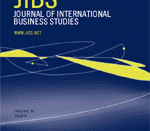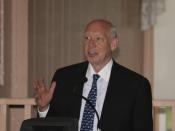Keynote Address at the International Association of BusinessCommunicators Conference in ChinaDistinguished guests, Ladies and Gentlemen,It is a great pleasure to be speaking at the International Association of Business Communicators (IABC) conference here in China. On behalf of the United States, it is a privilege to address you on the opportunities and challenges of being a global business manager in todayÃÂs global business environment.
The world has clearly entered an era of unprecedented global economic activity that includes worldwide production and distribution, as well as increasingly large numbers of international joint ventures, multinational mergers and acquisitions, and global strategic alliances (Daft, 2007, p. 210). Examples of new global operations and alliances abound, with almost every major firm earning more from their global than from their domestic operations. For businesses to thrive in the twenty-first century they must build the capabilities demanded by an evolving global market. Successful multinational companies have ascertained that in order to remain competitive they must employ top-notch global business managers to handle the challenges associated with global enterprise; with these challenges, many positive opportunities continue to emerge (Adler, 2008, pp.
5-8). Before we delve into these opportunities and challenges, letÃÂs first take a look at the core responsibilities of a global business manager.
Global business managers are first and foremost responsible for expanding the organizations global-scale efficiency and economies of scope. A global business manager successfully integrates worldwide operations by recognizing opportunities and challenges across national and functional boundaries as well as coordinating activities and linking capabilities across those barriers. An effective global business manager is a leading strategist, resource configuration architect, and worldwide coordinator. In the role of strategist, the business manager focuses on the integrations of production systems, as well as extends managerial reach by localizing and differentiating business systems while maintaining balance between local, regional, and global relationships; carefully evaluates potential partnersÃÂ services and expertise. In the role of architect, the business manager systematizes and configures resources and assets; brings order and organization to transactions taking place across national borders; interconnects key business capabilities across cultural barriers. Lastly, in the role of coordinator, the business manager analyzes and exploits product portfolio, market conditions, and competitive advantages; systemizes and integrates worldwide operations; and evades deteriorating sectors in order to preserve consumer allegiance, distribution control, and competitive flexibility (Bartlett & Ghoshal, 2003, p. 102).
As you can easily discern from the numerous responsibilities of a global business manager, it is imperative for a multinational company to employ the most knowledgeable and skilled candidate. This leads me into our next topic of discussion regarding the function of knowledge and skills in relation to cross-cultural awareness.
The magnitude of global business has generated a demand for managers knowledgeable in international business customs and practices. I would like to emphasize this statement because of the enormous impact cross-cultural awareness has on the success or failure of a multinational organization. Thoroughly understanding cultural orientations and mastering cross-cultural communication skills is critical in working with people from many different countries. And, because our own culture has a significant influence on how we interpret situations, it is imperative to step outside our parochial tendencies and try to see the situation from the viewpoint of all cultures involved (Hall, 1964, p. 154; Adler & Graham, 1989, p. 517). Because people from different cultures sometimes misunderstand one another, the potential for increased uncertainty, misevaluation, and confusion becomes high. But when a global business manager recognizes and uses cultural diversity to his or her advantage, the manager is able to minimize potential conflicts and maximize potential opportunities (Hall, 1964, p. 157). For example, if cultural awareness and diversity are well managed, companies can benefit from the product of enhanced ingenuity and resourcefulness, generation of solutions and decisions, openness to new ideas, and better understanding of customer needs (Adler & Graham, 1989, p. 532).
However, just as cultural awareness and diversity can benefit a company; it can also cause obstacles if not handled properly. Many studies have shown that the greater the significance in cultural diversity, the greater the possibility for misunderstanding and misinterpreting situations and dialogue. Effective communication is paramount in any multinational business transaction, and understanding the vast array of communication styles by different cultures poses a significant challenge for global business managers. For example, it would be important for a global business manager to know whether a company or colleague is relationship-focused or deal-focused, and do they use direct language or is the context surrounding their words more significant (Hall, 1967, p. 158). Many nonverbal cues such as greetings, eye contact, degree of formality, touching, silence, body language, and punctuality are all equally important in a cross-cultural situation (Sebenius, 2002, p. 80).
In closing I would like to summarize the key elements essential to the success of a global business manager. Whichever role the global business manager is playing, effective communication skills and cross-cultural awareness are fundamental to his or her success or failure. Additionally, through visionary thinking, creativity, leading, motivating, and problem solving, a global business manager can lead a multinational company into uncharted territories where the potential for opportunities are endless. Moreover, with a knowledgeable and effective global business manager at the helm of a multinational company, the long-term result is likely to be a robust and innovative organization well positioned for success in the new millennium.
Once again, I would like to commend the International Association of Business Communicators (IABC) for hosting this event in beautiful China.
Thank you, Ladies and Gentlemen, for you time and attention.
ReferencesAdler, N. J. & Graham, J. L. (1989, Autumn). Cross-cultural interaction: The international comparison fallacy? Journal of International Business Studies, 20(3), 515-537. Retrieved March 14, 2008, from JSTOR database.
Adler, N. J. (with Gundersen, A.). (2008). International dimensions of organizational behavior (5th ed.). Mason, OH: Thomason South-Western Corporation.
Bartlett, C. A. & Ghoshal S. (2003, August). What is a global manager? Harvard Business Review, 81(8), 101-108. Retrieved March 14, 2008, from Business Source Premier database.
Daft, R. L. (2007). Organizational theory and design (9th ed.). Mason, OH: Thomason South-Western Corporation.
Hall, E. T. (1964, December). Adumbration as a feature of intercultural communication. American Anthropologist, 66(6), 154-163. Retrieved March 14, 2008, from JSTOR database.
Sebenius, J. K. (2002, March). The hidden challenge in cross-border negotiations. Harvard Business Review, 80(3), 76-85. Retrieved March 14, 2008, from Business Source Premier database.





